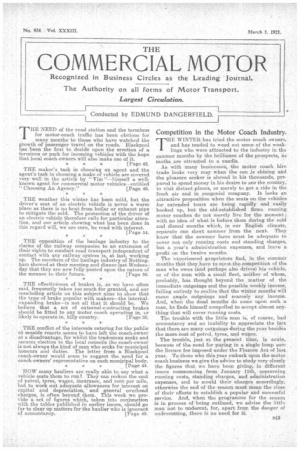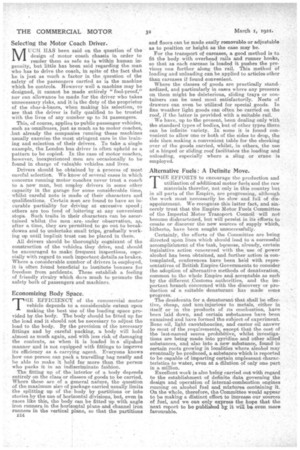Competition in the Motor , Conh Industry. T HE WINTER has tried
Page 1

Page 2

If you've noticed an error in this article please click here to report it so we can fix it.
the motor coach owners, and has tended to weed out some of the weaklings who were attracted to the industry in the summer months by the brilliance of the prospects, as moths are attranted to a candle. .
As with many businesses, the motor coach hire trade looks very rosy when the sun is shining and the pleasure seeker is abroad in his thousands, prepared to spend money in his desire to see the country, to visit distant places, or merely to get a ride in the fresh air and in congenial company. ' It looks an attractive proposition when the seats on. the vehicles for extended tours are being rapidly and, easily booked up, but the old-established firms running motor coaches do not merely live for the moment; with no idea of what is before them during the cold and dismal months which, in our English climate, separate one short summer from the next. They know that the summer fares must be adequate to cover not only running costs and standing charges, but a year's administration expenses, and leave a profit on the twelve months.
The 'experienced proprietors find, in the summer mantas that they,ha,ve te meet the competition of the man who owns (and perhaps also drives) his, vehicle, or of the man with a small fleet, neither of whom, probably, has thought beyond the matter of the immediate outgoings and the possible weekly, income, failing entirely to realize that the winter months will mean ample outgoings and scarcely any income. And, when the dead months do come upon such a man, he finds himself compelled to accept almost anything that will cover running costs. The trouble with the little man is, of course, bad accountancy and an inability to appreciate the fact that there are many outgoings during the year besides the mere cost of petrol, tyres, and wages. The trouble, just at the present time, is acute, because of the need for paying in a single lump sum the licence fee imposed under the Finance Act of last year. To those who this year embark upon the motor . coach business we give the advice to study very closely the figures that we have been giving, in different issues commencing from January nth, concerning running casts, standing charges, and' administration expenses, and to mould their charges accordingly, otherwise the end of the season. must mean the close of their efforts to establish a popular and successful service. And, when the programme for the season is in process of being outlined, we advise the little man not to undercut, for, apart from the danger of underciitting, there is no need, for it .
Selecting the Motor Coach Driver.
MUCH HAS been said on the question of the design of motor coach chassis in order to render them as safe as is within human iregenuity, but little has been said regarding the man who has to drive the coach, in spite of the fact that he is just as much a factor in the question of the safety of the passengers carried as is. the machine which he controls. However well a machine may be designed, it cannot be made entirely "fool-proof," nor can allowance be made for the driver who takes unnecessary risks, and it is the duty of the proprietor of the char-h-bance, when making his selection, to see that the driver is fully qualified to be trusted with the lives of any number up to 34 passengers.
This, of course, applies to public passenger vehicles, such as omnibuses, just as much as to motor coaches, but already the companies running these machines usually exercise the most stringent care in the. trainlugand selection of their drivers. To take a single example, the London bus driver is often upheld as a pattern to be copied.. In the ease of motor coaches, however, inexperienced men are occasionally to be found in charge of valuable vehicles, and lives. .
Drivers should be obtained by a process of most careful selection. We know of several cases in which concerns running motor coaches never trust a coach to a newman, but employ drivers in some other capacity in the garage for some considerable time, whilst careful note is made of their characters and qualifications. Certain men are found to have an incurable partiality for driving at exceseive speed ; others are too fond of loitering at any convenient stops.. Such traits in their characters can be ascertained whilst the men are. under observation, as, after a time, they are permitted to go out to breakdowns and to undertake small trips, gradually working up until implicit trust can be placed in them.
All drivers should be thoroughly cognizant of the construction of the vehicles they drive, and should be encouraged to make frequent inspection, especially with regard to such important details as brakes. Where a considerable number of drivers is employed, it is often found beneficial to institute bonuses for freedom from accidents. These establish a feeling of friendly rivalry which does much to promote the safety both of passengers and machines.
Economizing Body Space.
TTIE EFFICIENCY of the commercial motor vehicle depends to a considerable extent upon making the best use of the loading space provided by the body. The body should be fitted up for the load and it should not be necessary to adjust the load to the body. By the provision of the necessary fittings and by careful packing, a body will hold almost as much again, and with less risk of damaging the contents, as when it is loaned in a slipshod manner and is not equipped with fittings to improve its efficiency as a. carrying agent. Everyone knows how one person can pack a travelling bag neatly and be able to make it hold far more than the person who pa,eks it in an indiscriminate fashion.
The fitting up of the interior of a body depends entirely on the class or classes of goods to be carried. Where these are of a general nature, the question of the maximum size of package carried usually limits the splitting up of the body by partitions or into stories by the use of horizontal divisions, but, even in cases like this., the body can be fitted up with angle iron runners in the horizontal plane and channel iron runners in the vertical plane, so that the partitions
n14
and floors can be made easily removable or adjustable as to position or height as the case may be.
For the tra.neport of carcases, a good method is to fit the body with overhead rails and runner hooks, so that as each carcase is loaded it pushes the previous one further alone the rail. This method of loading and unloading can be applied to articles other than carcases if found convenient.
Where the classes of goods are practically stand• ardized, and particularly in eases where any pressure on them might be deleterious, sliding trays or container e can be used most satisfactorily. Nests of drawers can even be utilized for special goods. In fine weather light goods can often be carried on the roof, if the latter is provided with a suitable rail.
We have, up to the present, been dealing only with the standard types of bodies, but of other types there. can be infinite variety. In some. it is found convenient to allow one ar both of the sides to drop, the side then making a convenient table for the checking over of the goods carried, whilst, in others, the use of a hinged or sliding roof facilitates the loading and unloading, especially where a sling or crane is
employed. .
Alternative Fuels: A Definite Move.
THE EFFORTS to encourage the production and utilization of additional motor fuels and the raw materials therefor, not only in this, country but in all parts of the Empire, are progressing, although the work mast necessarily be slow and full of disappointment. We recognize this latter fact, and sincerely trust that the Empire Motor Fuels Committee of the Imperial Motor Transport Council will not become disheartened, but will persist in its efforts to create or discover the new sources of supply which, hitherto, have been sought unsuccessfully.
Certainly, the efforts of the Committee are being directed upon lines which should lead to .a. successful accomplishment of the task, because, already, certain legislative action concerned with the use of power alcohol has been obtained, and further action is contemplated, conferences have been held with representatives of British Empire Governments to consider the adoption of alternative methods of denaturation, common to the whole Empire and acceptable as such by the different _Customs authorities, and the important branch concerned with the discovery or production of a suitable denaturant has made some progress.
The desiderata for a denaturant that shall be effective, chea,p, and nan-injurious to metals, either in itself or in the products of its combustion, have been laid down, and certain substances have been examined and have formed the subject of experiment. Bone oil, light caoutchoucine, and castor ail answer to most of the requirements, except that the cost of the last-named seems prohibitive, whilst investigations are being made into pyridine and other allied substances, and also into a new substance, found in certain roots growing in localities where alcohol may eventually be produced, a substance which is reported to be capable of imparting certain unpleasant characteristics to water, even at a dilution of only one part in a million.
Excellent work is also being carried out with regard to the establishment of definite data governing the design and operation of internal-combustion, engines running on alcohol fuel and mixtures containing it. On the whole, therefore, the Committee would appear to be making a distinct effort, to increase our sources of fuel, and we can only express the hope that the next report to be published bs it will be even more favourable.
































